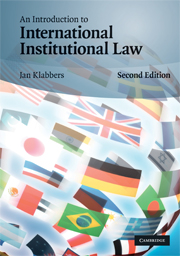Book contents
- Frontmatter
- Contents
- Preface to the First Edition
- Preface to the Second Edition
- Acknowledgements
- Table of cases
- A note on documentation
- List of abbreviations
- 1 Introduction
- 2 The rise of international organizations
- 3 The legal position of international organizations
- 4 The foundations for the powers of organizations
- 5 International organizations and the law of treaties
- 6 Issues of membership
- 7 Financing
- 8 Privileges and immunities
- 9 Institutional structures
- 10 Legal instruments
- 11 Decision making and judicial review
- 12 Dispute settlement
- 13 Treaty-making by international organizations
- 14 Issues of responsibility
- 15 Dissolution and succession
- 16 Concluding remarks: Towards re-appraisal and control
- Bibliography
- Index
12 - Dispute settlement
Published online by Cambridge University Press: 05 November 2012
- Frontmatter
- Contents
- Preface to the First Edition
- Preface to the Second Edition
- Acknowledgements
- Table of cases
- A note on documentation
- List of abbreviations
- 1 Introduction
- 2 The rise of international organizations
- 3 The legal position of international organizations
- 4 The foundations for the powers of organizations
- 5 International organizations and the law of treaties
- 6 Issues of membership
- 7 Financing
- 8 Privileges and immunities
- 9 Institutional structures
- 10 Legal instruments
- 11 Decision making and judicial review
- 12 Dispute settlement
- 13 Treaty-making by international organizations
- 14 Issues of responsibility
- 15 Dissolution and succession
- 16 Concluding remarks: Towards re-appraisal and control
- Bibliography
- Index
Summary
Introduction
All legal systems will have found a way to settle disputes between their subjects in a legally prescribed manner. These may range from having disputes settled by the elders of a tribe or village following their wisdom to highly formal and formalized procedures involving barristers, judges, juries and journalists, following strictly defined rules of law.
A similar variety can be seen within international organizations: most organizations will have some mechanism to settle disputes, and these may range from highly complex and organized ways where a premium is put on application of strict rules (the EC is the paradigm example) to rather more flexible ways where the ironing out of the conflict is deemed more important than the rigid application of strict rules (e.g., the old GATT).
Those different mechanisms may well stem from the consideration that, within an organization made up of a relatively small number of states, strict judicial settlement is somehow incongruous: if those states embark on a common project, it may not be a particularly good idea to have them meet in court on a regular basis; litigation, with its connotations of winners and losers, guilty parties and victims, crime and punishment, is not conducive to fostering the spirit of community. This may explain why advisory opinions are relatively popular within international organizations, whereas binding judicial settlement is reasonably rare and usually deals with the legal protection of individuals or companies rather than with inter-state disputes.
- Type
- Chapter
- Information
- An Introduction to International Institutional Law , pp. 229 - 250Publisher: Cambridge University PressPrint publication year: 2009

